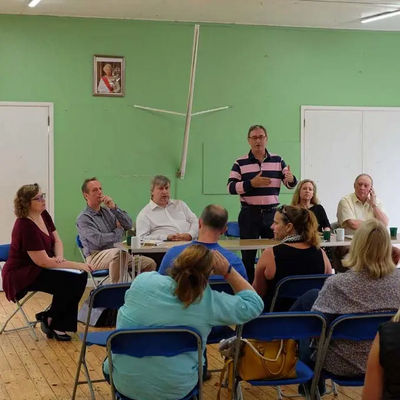Marlborough meeting discusses Wiltshire Council's options for special schools

Wiltshire Council are holding a three-month pre-consultation on the future of the county's special schools - for children with Special Education Need and Disability (SEND). On Monday (July 16) a meeting was held in Marlborough to discuss the consultation and to hear the views of Wiltshire councillors and parents.
Wiltshire is short of places for SEND children and there is some overcrowding in schools. It is estimated that Wiltshire will need 220 extra places by 2026.
The meeting was organised by Jo Waltham - a Liberal Democrat campaigner and parent of a child with special educational needs. On the panel were five Wiltshire councillors:
Two Conservative councillors - James Sheppard (Aldbourne & Ramsbury and the Council's Vice-Chairman) and Jane Davies (West Selkley and Portfolio holder for SEND and Safeguarding). Two Liberal Democrat councillors Ian Thorn (Calne) and Jon Hubbard (Melksham and chair of the Children's Select Committee). And Nick Fogg - Independent Councillor for Marlborough West.
Eleven members of the public attended - mostly parents of SEND children. The Councillors gave some of the background to the current pre-consultation on the future of special schools in Wiltshire and the work on the requirements by the task-group and scrutiny committee of Wiltshire Council.
These groups can advise but not enforce. The task group is cross-party and its deliberations are evidence based - speaking to parents and schools as part of their evidence gathering.
Provision of special schools is a statutory requirement on councils. The main issue aired at the meeting was the complexities due to the size and low population density of the county. The discussion lasted for an hour and a half.
Some issues have been decided: there will be extra, new provision for South Wiltshire which is relatively poorly served at present. Despite the overcrowding, there will be no new single 'super-school' to cover all designations of need.
Wiltshire Council is borrowing £30-40 million to pay for improved provision across the county.
Another main issue aired on Monday was travel times for SEND children to attend their schools. There are no statutory guidelines for transport times for SEND children. Department for Education advises councils that students of mainstream schools should travel for no more than 75 minutes, but SEND children may have to travel further.
There was some sympathy for the view that SEND children should travel less than this (say one hour) whenever possible. SEND children have particular issues with long-travel times due to anxiety and sensory processing disorder.
One idea that the meeting discussed was for specialist schools could take over management of student transport. This would allow better planning around specific needs and also allow school staff to be on the buses.
This would help drivers who, everyone agreed, have a difficult job. Travel to school could become a positive for many pupils - part of the day's education. But taking on this responsibility could only work for larger schools.
One way forward is to improve 'resource bases' for special needs in mainstream schools - like the one at Marlborough St Mary's Primary School. Though some heads embrace inclusivity in their schools, the costs are high and league tables discourage schools from becoming heavily involved in SEND.
The councillors were told that one size does not fit all. All SEND children are different and need tailored provision. Flexible approaches are needed. Children with complex needs cannot be catered for in resource bases.
It was said that reducing the number of special schools also reduces choice, increases travel times and encourages parents to take-up expensive, out of county provision (which already costs the county £11 million per year). Some children with complex needs require a small-school environment.
Rowdeford School, near Rowde, which was thought to be threatened with closure in May, is centrally placed, has a beautiful environment, supportive neighbours and room to expand. However, it also has planning problems due to flood risk, being in an area of outstanding natural beauty and having a listed main building. Expansion of Rowdeford was said to be a possibility.
The consultation is evidence based, but the meeting heard that this inevitably means it is focussed on provision that can cater for the majority and has problems with discussing specific, tricky cases. It is accepted that doing nothing is not an option as existing schools are overcrowded.
The consultation form has been changed to allow parents to add more of their own words in responding to the final question and people can complete the form a second time.
The results of this consultation will go back to the Council's cabinet - and a formal consultation will be needed on cabinet's specific proposals.
The consultation can be found here: http://wiltshire.objective.co.uk/portal/education/special_school_provision_in_wiltshire
